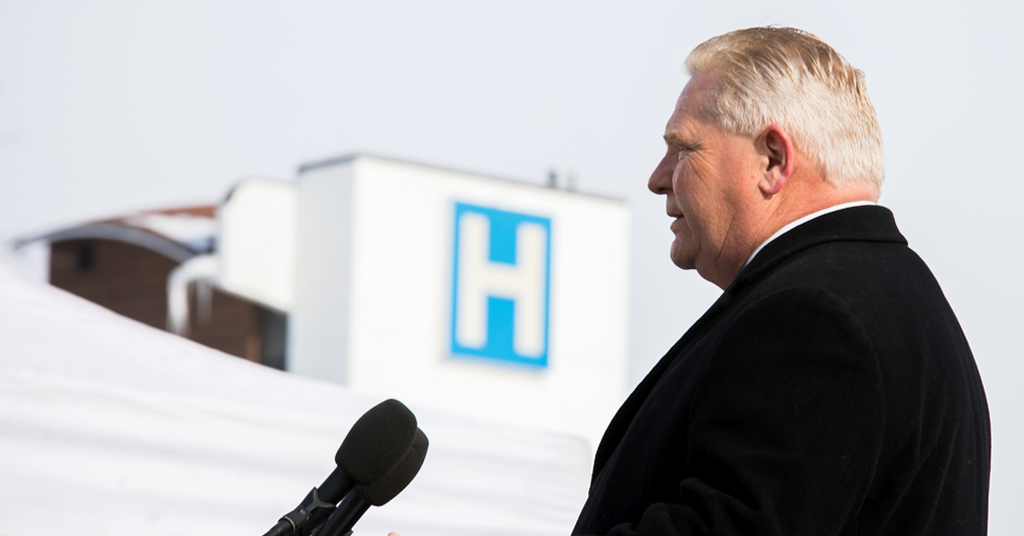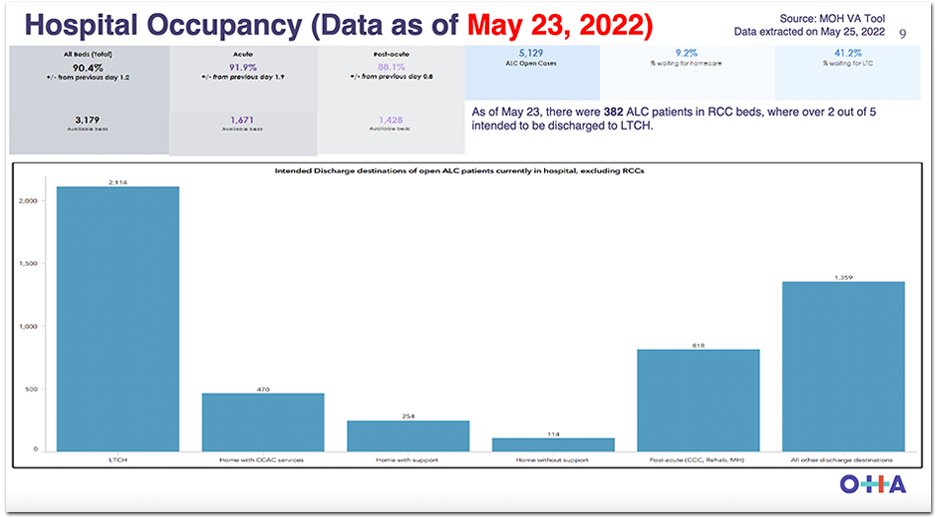
Doug Ford Said He’d End Hallway Healthcare. Ontario’s Hospitals are Still at Full Capacity.
Under Doug Ford’s ‘unprecedented’ health plan, Ontario hospitals remain at 90% capacity
While Doug Ford’s Ontario PCs claim to be making ‘unprecedented’ investments in healthcare, Ontario still has fewer hospital beds than it did in the 1990s – and its overall beds per capita remain below the national average.
Earlier this year, Ford said “our government is making unprecedented investments to build a health and long-term care system that delivers the quality of care our loved ones deserve.”
Ontario is making unprecedented investments in health care and supports for businesses & people. A 35% increase to the Canada Health Transfer this year will provide the fair and flexible funding needed to fight COVID-19.https://t.co/a8jMqncXZw pic.twitter.com/TJ4jC13rGC
— Doug Ford (@fordnation) September 21, 2020
The 2022 budget notes “Ontario has built unprecedented hospital capacity since the start of the COVID‐19 pandemic.”
Yet, data from the Financial Accountability Office shows Ontario has 38,416 hospital beds – still well below the 1990 peak of around 50,000 beds even including the 3,522 “surge beds” the government has added throughout the pandemic.
As the FAO notes, decades of cuts by Ontario Liberal and Ontario PC governments made it easy for COVID-19 to overwhelm the province’s hospitals.
The Government of Ontario announced ‘surge funding’ to boost hospital capacity.
But Ontario hospitals are already stretched thin – many hospitals in Ontario operated at above 100% capacity in 2019.https://t.co/LAEKwvvOvd #onpoli #canlab
— PressProgress (@pressprogress) March 17, 2020
The FAO noted “Ontario has one of the lowest number of hospital beds as a share of the population and is below the Canadian average.”
The Canadian Centre For Policy Alternatives likewise noted from 2020-21, Ontario also had the lowest rate of healthcare spending per capita in Canada.
“Doug Ford was elected in part promising to end hallway medicine. On that particular count he has failed,” Canadian Association of Emergency Physicians co-chair Dr. Alan Drummond said.
“The reason we have crowded emergency departments is we have patients who are deemed to require admissions to hospital wards but they have no beds to go to and so they spend 12, 14 hours waiting” Drummond said. “In the bigger hospitals it’s never one such patient, it’s always 10, 15 or 25.”
As of May 23, 2022, the Ontario Hospital Association notes the province’s hospitals still have 90% of their total hospital beds occupied and 91.9% of their critical care beds occupied.

Ontario Hospital Association
“We define a safe hospital as one with 85% occupancy. That gives us a bit of flexibility in times of surge,” Drummond said. “Ontario hasn’t seen a safe hospital since the beginning of the COVID-19 wave.”
While the budget – which may be changed after the election – claims it is investing enough to make these 3,522 surge beds “permanent,” the FAO said that would cost $1.536 billion.
Yet, the 2022 budget promises to spend “$3.5 billion over three years starting in 2022–23” to do so. While the government has allocated $1.5 billion this year, that averages just $1.16 billion per year as a whole.
“Michael Hurley, President Ontario Council of Hospital Unions, told PressProgress “What we saw during the peak of COVID-19, where most hospital services were redirected to the pandemic, is a system which operates at or near capacity constantly, particularly in major urban centres, brought to its knees by an unexpected additional pressure.”
“Hospital staffing is the same as it was when Ford formed government (247,000) serving a population that is much larger, older and more acutely ill,” Hurley said.
“Compounding the staffing and bed crisis is a loss of nurses and other health care workers who are leaving because of the lack of respect they feel from this government,” he said. “Denied effective protective equipment for much of pandemic and facing 10% cuts to real wages because of the Ford government’s Bill 124, this mass exodus is a significant threat to the stability of the hospital system.”
Niko Georgiadis, chair of the Canadian Union of Public Employees’ Ambulance Committee of Ontario, said the trend of chronic underfunding has worsened the quality of patient care.
“I’m hoping the next Ontario government makes the required investments,” Georgiadis told PressProgress. “We as citizens of Ontario deserve a functioning public health system where people don’t wait hours and hours to be seen by a healthcare professional.”
Fewer hospital beds, he said, means patients wait longer to be offloaded during emergencies. Earlier this year, that led to serious “code red” shortages of emergency services.
“Paramedics are used to spending a lot of time on offload delay due to lack of hospital capacity and nursing shortages. Paramedic services across Ontario are understaffed to begin with and when you add offload delays and higher 911 call volumes, it further undermines patient care.”
The Ontario PCs did not respond to requests for comment from PressProgress.
Meanwhile, hundreds of private healthcare companies have busied themselves lobbying the Ford government to privatize or outsource parts of the system.
Our journalism is powered by readers like you.
We’re an award-winning non-profit news organization that covers topics like social and economic inequality, big business and labour, and right-wing extremism.
Help us build so we can bring to light stories that don’t get the attention they deserve from Canada’s big corporate media outlets.
Donate



